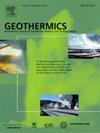利用摩洛哥北部水文地球化学数据预测地热储层温度:一种机器学习方法
IF 3.5
2区 工程技术
Q3 ENERGY & FUELS
引用次数: 0
摘要
地热能勘探依赖于对储层温度的准确估计。然而,传统方法复杂、昂贵且不确定,特别是基于间接测量和假设的方法。建立了99组水文地球化学和储层温度数据集,并应用决策树回归(DTR)、极端梯度增强(XGBoost)、极端随机树(XRT)、自然梯度增强(NGB)和深度神经网络(DNN)等5种机器学习(ML)算法来解决这一问题。通过基本性能指标,包括平均绝对误差(MAE)、均方根误差(RMSE)和决定系数(R²),评估了模型在摩洛哥北部的预测准确性和推广潜力。XGBoost模型的最高R²为0.9967,最低MAE和RMSE分别为0.7046和0.9992。此外,本研究利用Shapley加性解释(SHAP)作为一种可解释的技术来评估XGBoost预测决策。SHAP解释SiO2是预测储层温度最重要的变量。该研究强调了ML在准确预测储层温度方面的潜力,为模型选择和推进地热资源的认识提供了可靠的工具。本文章由计算机程序翻译,如有差异,请以英文原文为准。
Geothermal reservoir temperature prediction using hydrogeochemical data of Northern Morocco: A machine learning approach
Geothermal energy exploration depends on accurate estimation of reservoir temperatures. However, conventional methods are complex, costly and uncertain, especially those based on indirect measurements and assumptions. A dataset of 99 sets of hydrogeochemical and reservoir temperature data was created and five machine learning (ML) algorithms including decision tree regression (DTR), extreme gradient boosting (XGBoost), extremely randomised trees (XRT), natural gradient boosting (NGB) and deep neural network (DNN) were applied to address the issue. The models' predictive accuracy and generalisation potential in northern Morocco were evaluated by essential performance metrics including mean absolute error (MAE), root mean square error (RMSE) and coefficient of determination (R²). The XGBoost model proved superior with the highest R² of 0.9967 and the lowest MAE and RMSE of 0.7046 and 0.9992 respectively. Further, this study utilises Shapley additive explanation (SHAP) as an explainable technique to evaluate XGBoost predictive decisions. SHAP interpreted that is the most important variable in predicting reservoir temperature. This study highlights the potential of ML for accurate reservoir temperature prediction, offering a reliable tool for model selection and advancing understanding of geothermal resources.
求助全文
通过发布文献求助,成功后即可免费获取论文全文。
去求助
来源期刊

Geothermics
工程技术-地球科学综合
CiteScore
7.70
自引率
15.40%
发文量
237
审稿时长
4.5 months
期刊介绍:
Geothermics is an international journal devoted to the research and development of geothermal energy. The International Board of Editors of Geothermics, which comprises specialists in the various aspects of geothermal resources, exploration and development, guarantees the balanced, comprehensive view of scientific and technological developments in this promising energy field.
It promulgates the state of the art and science of geothermal energy, its exploration and exploitation through a regular exchange of information from all parts of the world. The journal publishes articles dealing with the theory, exploration techniques and all aspects of the utilization of geothermal resources. Geothermics serves as the scientific house, or exchange medium, through which the growing community of geothermal specialists can provide and receive information.
 求助内容:
求助内容: 应助结果提醒方式:
应助结果提醒方式:


